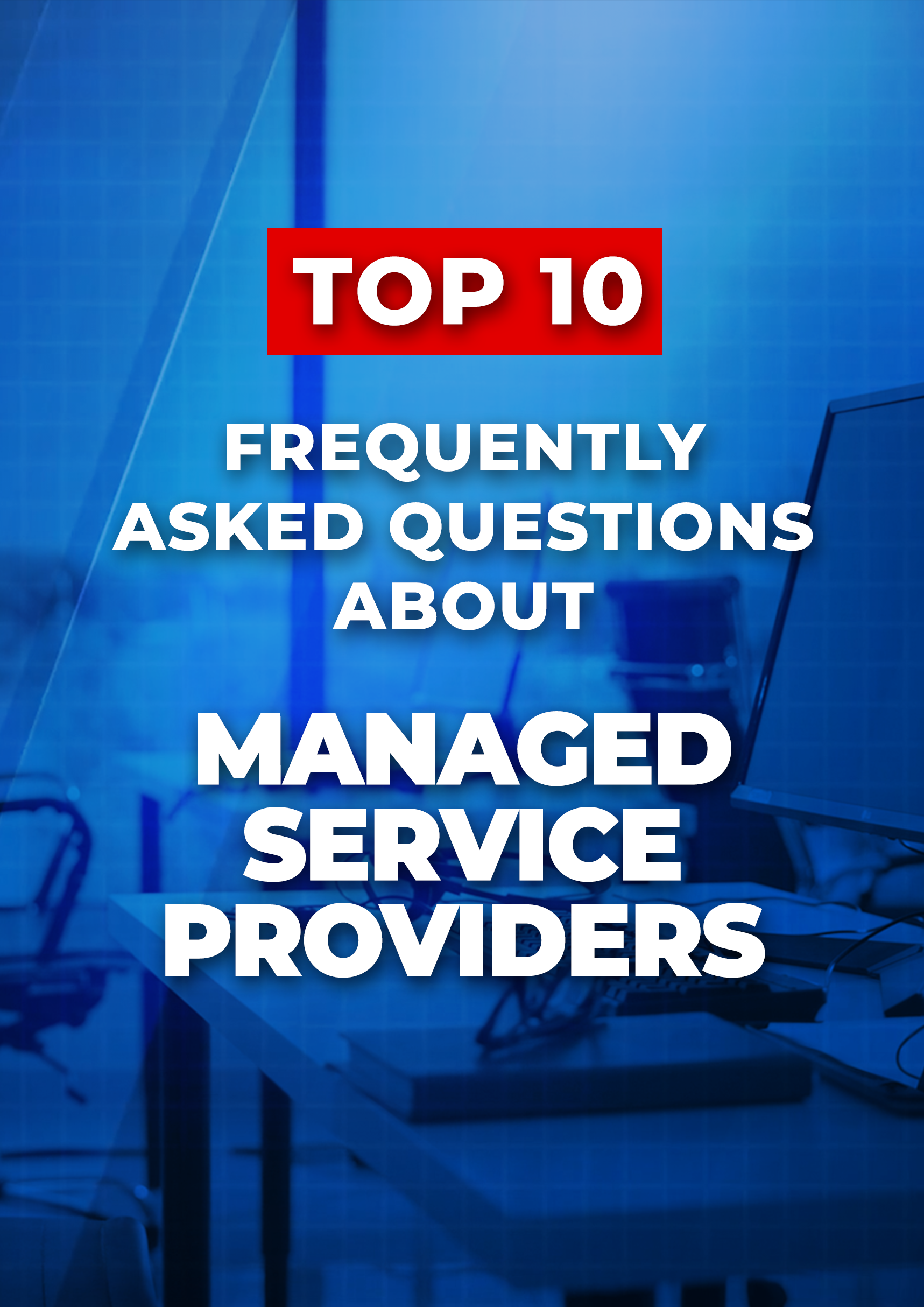TOP 10 FREQUENTLY ASKED QUESTIONS ABOUT MSPs
Have questions about MSPs? This top ten of frequently asked questions can help you understand why so many turn to MSPs. You'll learn about:
1. What does MSP stand for?
MSP stands for managed service provider. This is a third-party that can support your software, networking, and hardware infrastructure. The MSP’s experts provide all-around support. This can include installing software, updating hardware, patching systems, and tracking security.
2. Who can use an MSP?
This strategic method of optimizing business technology and operations is for all. Managed services typically help small and medium-sized businesses, nonprofit organizations, and governments.
3. Why use managed services?
You gain skilled help without having to recruit or worry about training or retention. Many MSPs also offer 24/7 support, and you don’t have to worry about sick leave or vacation time.
When you work with an MSP, the provider’s IT experts get to know you and your business processes. They support technology and can recommend savings and ways to keep you competitive. Adding this enhanced expertise can help ensure your security and compliance, too.
4. What if we already have internal IT?
Business is going increasingly digital, and your internal IT team can be hard-pressed to keep up with all aspects of the job, especially with modern cybersecurity needs changing daily. Don’t risk a missed endpoint that hackers use to exploit your systems. Working with an MSP gives your in-house experts skilled backup. Offloading particular tasks allows them to focus on security or other business tech initiatives.
Today’s market for IT specialists is competitive. Keep internal employees happy by letting them hand off routine tasks to an MSP. Whatever your need, contract with an MSP on a project basis to alleviate in-house workload.
5. What’s the difference between an MSP and the break-fix approach?
The break-fix model is a short-term approach. Even if you have a repair shop you consistently go to, that consultant is focused only on what’s gone wrong this time.
On the other hand, the MSP gets to know your setup and business needs. They take action to prevent your technology failing in the first place. In the event of a breakdown, they do get you back up and running, but they have the context to suggest fixes that fit your overall objectives.
You may think your network and technology have no issues. So, why spend valuable budget on an MSP? You could be missing out on efficiencies or vulnerabilities and not know it. MSP experts put in place preventative measures to make your network more robust and reliable.
6. What are some examples of managed IT?
Managed services can run the gamut to include responsibilities such as:
supporting your technology in a break-fix situation;
helping your IT infrastructure run better;
providing server monitoring and IT maintenance;
managing and meeting your evolving technology needs;
reducing your business costs by reducing hardware and software infrastructure costs;
increasing operational efficiency;
securing your systems, backing up your data, and planning for disaster recovery;
supporting your users and their IT needs;
matching your business with the right technology for the task;
developing strategy for your smooth cloud migration.
7. Will you lose control of your IT with an MSP?
Your MSP can tackle all sorts of IT tasks to add efficiency and secure systems. Yes, you typically give the MSP remote access to your network, but you remain in charge of your IT. Think of it instead as adding a partner to focus on time-consuming, complicated, and repetitive tasks. This frees your people up to drive innovation and generate revenue.
8. How are managed services priced?
This will depend on the MSP partner. The company could charge based on the services you use, by the hour for performing those services, by the number of users serviced, by the number of devices serviced, or some combination of all those. Typically, you agree to an annual service contract that you pay on a consistent, monthly basis.
Keep in mind that MSPs can save you money, too. One of the first things an MSP does is get an overview of your systems, software, and hardware. They can often lower your IT overhead by looking at all bills and subscriptions to right fit your plans. Plus, if there’s a problem, you don’t have to pay a premium for rush services (as you would with a break-fix shop).
9. How to know an MSP may not be for you
While anyone can benefit from working with an MSP, managed services aren’t for everyone. For instance, if any of the following statements are true about you, you’re less likely to want to work with an MSP:
"I like to spend a lot of time learning about IT.”
“I’m prepared to invest hours of effort proactively stabilizing my network.”
“I prefer to work with my non-professional cousin to secure my systems.”
“I see inefficient technology as a challenge that makes my employees grow.”
“I want to use the same technology until I retire, because it works just fine for me.”
“I’m not worried about anything happening to my technology. If it does, we’ll get it fixed eventually.”
10. How to choose the MSP for you
Managed services can help any business seeking IT support. The right MSP can help with cloud migration, corral spending, manage critical storage, maintain systems, and more. They'll also keep you updated on changing technology trends and security challenges.
To select the MSP that best suits your needs, explore their understanding of your particular infrastructure. Also, look for someone who knows your industry. A local presence can prove useful as well.
Find out from business peers who they work with and would recommend. Ask for client references to learn about service commitment, cost certainty, and responsiveness.
We’re here to help you achieve your goals with effective and efficient technology. Give us a call at 212-602-1602 and learn more about us today!

